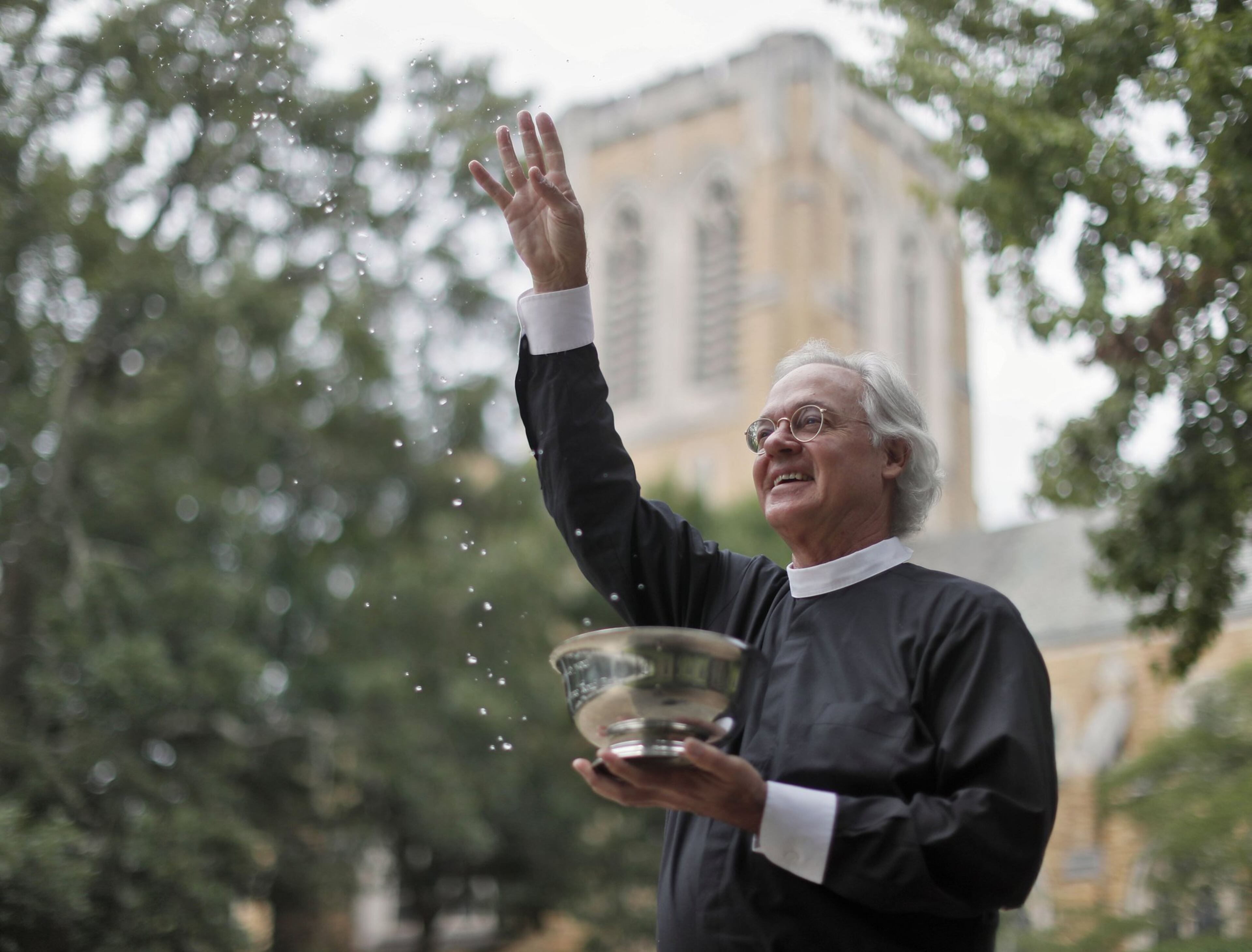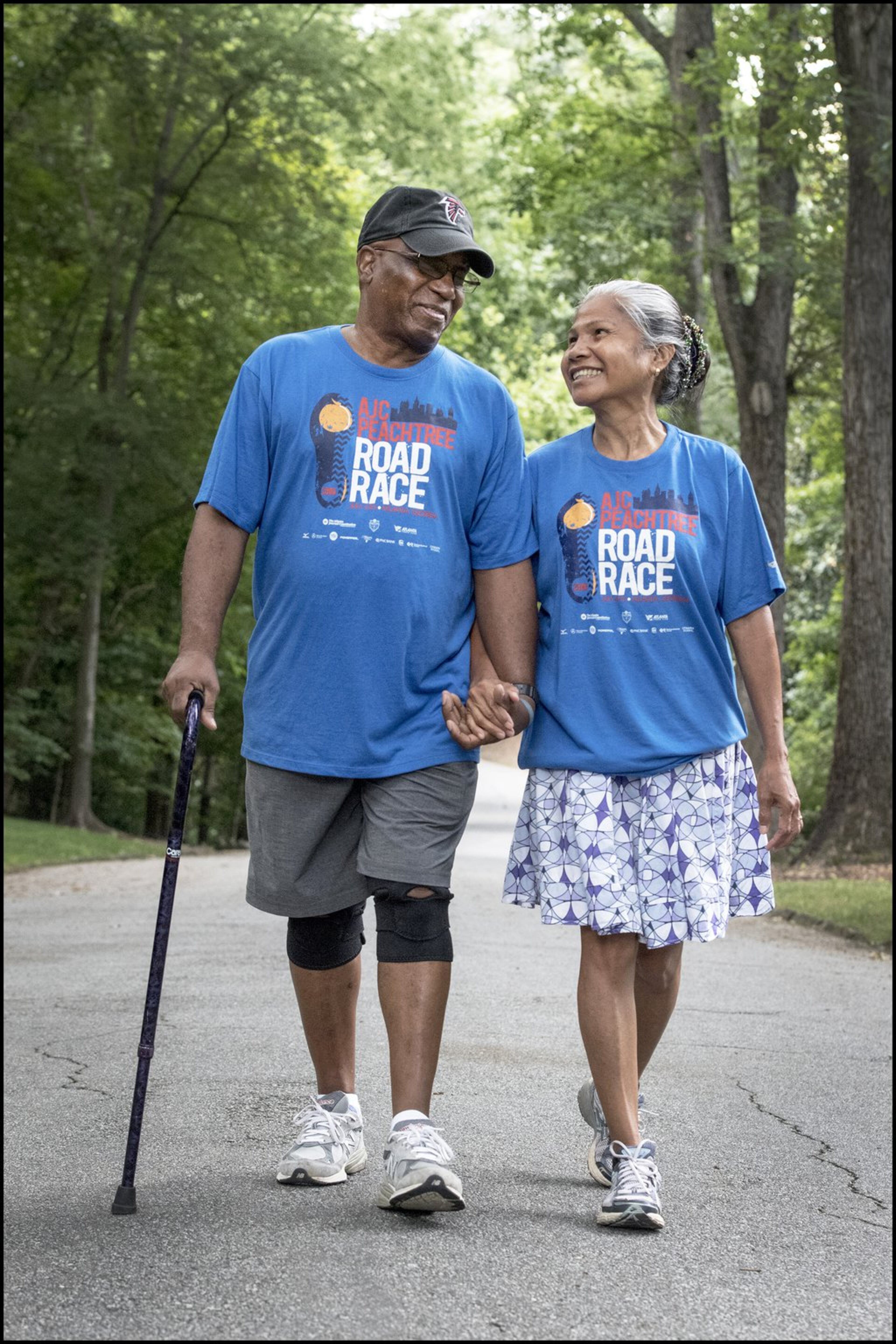At 50th race, AJC Peachtree Road Race is enduring symbol of Atlanta
Less than two weeks ago, Tim McLaughlin was finishing up a sprint at a high school track in Atlanta when he fell – hard.
Blood gushing down his face, McLaughlin realized his nose was almost certainly broken. He struggled to breathe. As a group of runners rushed to his aid, the 49-year-old sprang to his feet. He had only one thought. And it wasn’t about his nose or his red and scratched face.
“My legs are good. I can still run the Peachtree,” he said emphatically.
The die-hards around him understood.

It's that kind of devotion and emotional attachment that's helped solidify the AJC Peachtree Road Race's top position among the nation's 10Ks. Thursday, 60,000 people are expected to participate in what's become the largest 10-kilometer race in the world.
Runners of all ages, shapes and sizes have signed up for the 4th of July event, which will be run for the 50th time, despite facing challenges over the years.
Many say the AJC Peachtree Road Race, organized by the Atlanta Track Club, is more than a race.
For some, it’s proof — of commitment to a New Year’s resolution, or recovery from an illness, or dedication to a healthy lifestyle. It’s also a shared cultural experience, an enduring symbol of Atlanta.
The miles-long stretch of runners, combined with thousands of volunteers and spectators, transform Peachtree Street into an all-out celebration, a patriotic party awash in American flags and red-and-white-and blue costumes and the singing of patriotic hymns by several churches along the route.
“I call it Atlanta’s finest day,” said Bob Wells, who is 57 and lives in Marietta. He’s run every Peachtree Race since 2005 — with one exception, in 2008, when he traveled to Burkina Faso in West Africa on a mission trip. “It’s truly a celebration of life and everyone coming out and having a good time. There’s just so much goodness.”

This year’s event once again will include Atlantans Laurie Silberman, 61, and her 28-year-old daughter, Cari Buchwald. After each race, they lay all of their Peachtree T-shirts on a bed and reminisce about each one. Thursday’s Peachtree will be the 28th for Silberman. Also in the pack will be Walter Hawkins, a 73-year-old Navy veteran who has battled back from paralysis from a spinal tumor, and Bill Thorn, who is 88 and has run every Peachtree.
And then there’s McLaughlin, who recently underwent surgery to repair his fractured nose.
Five years ago, McLaughlin ran his first Peachtree Road Race. He started eating healthier, exercising more and, little by little, has lost 70 pounds.
“For me, this represents my journey from where I came from,” said McLaughlin, who lives in Toccoa and is a member of the Atlanta Track Club. “I will cross that finish line one way or another.”

The AJC Peachtree Road Race started on Independence Day in 1970 with only 150 people entering and 110 crossing the finish line. No big road closures were needed. No cheering crowds looked on. No T-shirts were handed out.
MORE: First AJC Peachtree Road Race winner still runs strong, just not at the front
Now, it generates about $2.8 million in entry fees annually. That doesn’t cover the $4 million in expenses for everything from T-shirts, police, portable toilets and staffing, but sponsorships from private donations and corporations — including Home Depot, Waffle House and UPS — make up the difference.
It was a combination of good timing, strong leadership, cooperation and even some fortunate accidents that helped the race rise from modest beginnings to a social phenomenon.
Born at the cusp of the 1970s running boom, the Peachtree Race had a perfect first-time winner in Jeff Galloway, who became one of its lead ambassadors. He touted the Peachtree to runners of all speeds, but also brought in friends like Olympic Gold medalist Lasse Viren to compete.
Atlanta Track Club Executive Director Rich Kenah said The Atlanta Journal-Constitution, which began sponsoring the event in 1976, provided publicity and promotion that helped the race grow quickly. Within three years of the AJC becoming its title sponsor, the race grew from 1,200 to 12,000 runners.
Observers also credit former race director Julia Emmons with being a savvy and proactive leader who helped the Peachtree thrive.

But it wasn’t always a smooth ride to success.
While churches along the route now embrace the race, there was some strong opposition years ago, especially when race day fell on a Sunday.

In 1982, the churches threatened to file suit to have the race moved to July 5, complaining that the planned date could make it harder for worshippers to come to Sunday services. The Rev. Andrew Young, Atlanta’s mayor at the time, mediated. A compromise was reached, and the race began at 7:30 a.m. instead of 8 a.m.
In 1993, another year when the race was on a Sunday, some churches canceled or combined services. The issue arose again in 1999. The Rev. Sam Candler of the Cathedral of St. Philip recalled meeting Emmons before the 1999 race.
The meeting could have been tense.
"I remember she came to my office, and I said 'We're not going to curse. We're going to bless,'" Candler said of the cathedral's mindset about the race's impact on worship services. Candler decided to sprinkle holy water outside his church. That tradition continued and has become a fixture of the race.

Other elements that helped build affinity for the race happened by chance. In the early years, Emmons said, the race would run out of T-shirts. So, they became coveted keepsakes. At first, only the fastest runners received the T-shirts. In 1976, when the number of participants exceeded expectations because of same-day registrations, about half of the 2,250 runners missed out on shirts.
“We heard all kinds of things about people kicking and tripping and scratching to beat out their competitors just to get a T-shirt,” race official Sue Peters is quoted as saying in the book “25 Years of the Peachtree Road Race.”
Emmons, who took the helm of the race in 1985, decided every finisher would get a T-shirt.
“You run six miles in the heat, you should be proud of yourself and you earn that T-shirt,” said Emmons.
The shirts have elicited strong emotions — and not always in a good way. There was almost universal fury over the 1994 edition, known simply (and often accompanied by groans) as “The Pumpkin,” because that’s what the bright orange peach on the front resembled.
Angry Peachtree finishers called the Atlanta Track Club for days, if not weeks.
“I’m very glad social media didn’t exist back then, or it would have broken the computer,” said Emmons. “People were so mad. People said it ruined their lives.” She even received a petition signed by hundreds of people asking her to never to do “that” again.
Emmons did make a change. She and her staff would no longer decide on the T-shirt, giving way to an annual contest with public voting.
The race, meanwhile, continued to grow.
In 1980, the Atlanta Track Club decided to cap the race at 25,000 participants. But it would reach capacity within days of registration forms being published. Many who traditionally ran the race were being left out.
“Our most loyal runners had been cut out, and we hadn’t really seen it coming,” said Emmons, who was executive director of the club for 22 years, until 2007. “People were mad because this was their tradition, and they planned their vacations around running the road race.”
Emmons estimated that, at one point, there were at least 15,000 hopeful runners left out of the race. A decision was made in 1990 to increase the race to 40,000 participants.
A few years later, that number was extended to 50,000. In 2011, when it reached 60,000, an online lottery system was instituted for registration.
As the race grew, the Atlanta Track Club began staggering start times to better manage the crowd.
There are now 21 start waves to manage the crush of runners, who begin at 7 a.m. at Lenox Mall, head down Peachtree Street and onto 10th Street, finishing at Piedmont Park.
Even with the sustained popularity and size of the AJC Peachtree Road Race, Kenah said there are no plans to increase it beyond the 60,000-runner cap. If expanded, more people would be running late in the morning in the heat of the day. Temperatures for Thursday are forecast to reach 76 degrees by 8 a.m. and 83 degrees by 10 a.m. accompanied by light and variable winds, typical weather for this time of year, according to Channel 2 chief meteorologist Glenn Burns.
Dr. Jonathan Kim, the chief medical director for the Atlanta Track Club, estimated the medical tents served about 400 runners at last year’s race.
Still, the summer heat and crowds haven’t stopped the race from being one of the most unifying events in Atlanta.

Sean Barrett, a 41-year-old Atlantan, enjoys the vibe of the race, but he mostly runs it in memory of his father, Alfred Barrett. The elder Barrett, who died in 1994, loved the race.
“If my dad was here, we could run the race together,” said Barrett, who has participated every year since 2000.
“And when I run the race, I feel his presence. He’s right here with me, pushing me.”
Wells, the Marietta man who missed one race for his mission trip, said the Peachtree was his “saving grace” during a tough time, when he was going through a divorce several years ago.

Hawkins feels similarly. Diagnosed with stage IV lung cancer in early 2014, he then suffered paralysis from a spinal tumor.
With encouragement from his Emory doctors, he set a lofty goal a few years back: walk the Peachtree Race.
His first challenge was to stand up, then to take a few steps to reach his wheelchair. Then, he set his sights on walking with a walker and later with a cane. This will be his fifth consecutive year in the race. He and his wife of 40 years, Paulina, will walk-run the Peachtree together.
"When I walk the Peachtree, there are a lot of people my age and older, and there's young people. And there's this spirit they all have and the effort they are making," said Hawkins, who lives in the Ellenwood neighborhood of DeKalb County. "My goal is to run the Peachtree and work toward the next one. For me, the Peachtree is what I use to establish my tomorrow."
Staff writers Raisa Habersham and Eric Stirgus contributed to this article.
The AJC Peachtree Road Race
» 50 races, 49 years: So very many T-shirts
» The Original 110: They were finishers in the first race in 1970
» Bill Thorn: Looking forward to his 50th run in the AJC Peachtree
» Gayle Barron blazed a trail as first female AJC Peachtree Road Race winner
» The 50th AJC Peachtree: A look at the history and future
» News and updates from the AJC Peachtree Road Race
Five biggest races in the country
1. The AJC Peachtree Road Race
Finishers: 56,993
Distance: 6.2 miles
2. New York City Marathon
Finishers: 51,267
Distance: 26.2 miles
3. BOLDERBoulder in Boulder, Colo.
Finishers: 44,671
Distance: 6.2 miles
4. Lilac Bloomsday Run in Spokane, Wash.
Finishers: 42,206
Distance: 7.46 miles
5. Chicago Marathon in Chicago
Finishers: 40,523
Distance: 26.2 miles
SOURCE: Runner's World 2017 report


